Dover Athletic F.C.
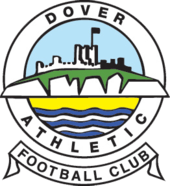 | ||||
| Full name | Dover Athletic Football Club | |||
|---|---|---|---|---|
| Nickname(s) | The Whites[1] | |||
| Founded | 1983[1] | |||
| Ground | Crabble Athletic Ground[2] | |||
| Capacity | 5,745 (1,010 seats)[3] | |||
| Chairman | Jim Parmenter[4] | |||
| Manager | Chris Kinnear | |||
| League | National League | |||
| 2015–16 | National League, 5th | |||
|
| ||||
Dover Athletic Football Club is a professional association football club based in the town of Dover, Kent, England. The club was formed in 1983 after the dissolution of the town's previous club, Dover F.C., whose place in the Southern League was taken by the new club. In the 1989–90 season Dover Athletic won the Southern League championship, but failed to gain promotion to the Football Conference as the club's ground did not meet the required standard. Three seasons later the team won the title again and this time gained promotion to the Conference, where they spent nine seasons before being relegated at the end of the 2001–02 season. The club was transferred to the Isthmian League Premier Division in 2004, but another poor season and financial problems that had been mounting led the club to a further relegation. After three seasons were spent in the Isthmian League Division One South, the club won the championship and with it promotion back to the Premier Division, followed immediately the following season by another championship and with it promotion to Conference South. Five seasons were spent in that division with the club coming close to gaining promotion several times, reaching the play-offs three times. In the 2013–14 season, Dover reached the play-off final for the second successive season and defeated Ebbsfleet United to return to the Conference Premier after a twelve-year absence.
The team usually wear white shirts and are consequently nicknamed the Whites. They have played at the Crabble Athletic Ground since the club's formation. The club's best performance in the FA Cup was an appearance in the third round proper in the 2010–11 and 2014–15 seasons, while the best performance registered in the FA Trophy, the national competition for higher-level non-league clubs, was a run to the semi-finals in the 1997–98 season.
History
Dover Athletic F.C. was formed in 1983 after the town's previous club, Dover, folded due to its debts. The new club took Dover's place in the Southern League Southern Division,[2] with former Dover player Alan Jones as manager and a team consisting mainly of reserve players from the old club.[5] Initially Athletic struggled, finishing second from bottom of the table in the 1984–85 season.[5][6] In November 1985 Steve McRae, who had succeeded Jones a year earlier, was sacked and replaced by Chris Kinnear.[5]
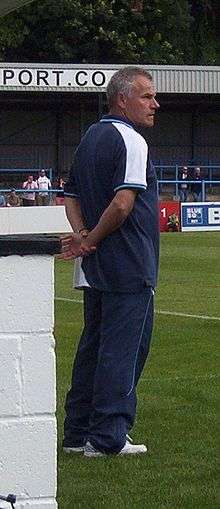
Under Kinnear the club's fortunes turned round, with two top-five finishes followed by the Southern Division championship, and with it promotion, in the 1987–88 season.[6] The team started strongly in the Premier Division, finishing in sixth place at the first attempt, and then winning the championship in the 1989–90 season.[7] The club was denied promotion to the Football Conference, however, as the Crabble Athletic Ground did not meet the standard required for that league.[2] After finishing fourth and second in the subsequent two seasons, Dover won the title again in the 1992–93 season and this time were admitted to the Conference.[7]
Although Dover finished in eighth place in their first season in the Conference,[8] the following season saw the club struggling against relegation, and Kinnear was dismissed due to a combination of the team's poor performances and his own personal problems.[5][9] John Ryan was appointed as the club's new manager,[10] but his reign was a short one and he was dismissed when the club lost seven of its first eight matches in the 1995–96 season.[11] The club then appointed former England international Peter Taylor as manager, but he was unable to steer the team away from the foot of the table, and Dover held onto their place in the Conference only because Northern Premier League runners-up Boston United failed to submit their application for promotion before the required deadline.[11]
Bill Williams took over as manager in 1997 and led the club to the FA Trophy semi-finals in the 1997–98 season and a best league finish to date of sixth place in the 1999–2000 season.[7][12] Williams left the club to take a senior position with Conference rivals Kingstonian in May 2001.[12] By now the club was in severe financial difficulties, with a number of directors resigning and debts exceeding £100,000. Amid the crisis the entire board of directors resigned, forcing the club's Supporters' Trust to take over the running of the club,[13] and manager Gary Bellamy was sacked after just six months in the job.[14][15] Former Everton goalkeeper Neville Southall took over but was dismissed just three months later, with Clive Walker taking over in March 2002 with the club rooted to the foot of the table.[16] The club finished the season bottom of the Conference and was relegated back to the Southern League Premier Division.[17] The club's ongoing financial problems led to it entering a Company Voluntary Arrangement (CVA), a process by which insolvent companies offset their debts against future profits, due to debts that were now estimated at £400,000.[18]
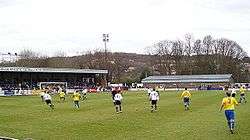
In Dover's first season back in the Southern League Premier Division the Whites finished in third place, albeit 17 points adrift of Tamworth, who claimed the one promotion place available that season.[6] A poor start to the following season saw Walker replaced by Richard Langley.[19] Dover finished the season in 19th place, before being switched to the Isthmian League Premier Division in the summer of 2004 following a re-organisation of the English football league system.[7] The new season started with six successive defeats, which saw Langley sacked, and the financial problems continued, with the club coming within two months of being closed down.[20][21] Dover were relegated to the Isthmian League Division One at the end of the season,[7] but were saved from possible extinction in January 2005 when former director Jim Parmenter returned to head up a consortium that took over the club.[22] Parmenter quickly sacked manager Steve Browne and convinced Clive Walker to return to the club to replace him,[23] and also arranged for the club's outstanding CVA debts to be cleared, putting the club on a firm financial footing for the first time in many years.[24]
Dover Athletic narrowly missed out on an immediate return to the Premier Division in the 2005–06 season, reaching the play-offs for promotion but losing out to Tonbridge Angels.[25] The following season Dover again reached the play-offs but lost in the semi-final to Hastings United,[26] after which Walker did not have his contract renewed and was replaced by former Gillingham manager Andy Hessenthaler.[4] In his first season in charge he led the club to the Division One South championship and promotion to the Isthmian League Premier Division.[27] The following season Dover won a second consecutive championship and thus gained promotion to Conference South.[28] In the 2009–10 season, Dover reached the play-offs for promotion to the Conference National, but lost at the semi-final stage to Woking.[29] The following season the club reached the third round of the FA Cup for the first time after wins over Kent rivals Gillingham in the first round[30] and another League Two club, Aldershot Town, in the second round.[31] In the 2012–13 season the club again reached the play-offs, but this time lost in the final to Salisbury City.[32] The following season the team reached the second round of the FA Cup, losing 1–0 to Milton Keynes Dons,[7] The last 16 of the FA Trophy, narrowly losing 3–2 to Eastleigh and made the play-offs once more.[33] A 4–1 aggregate victory over Sutton United in the semi-final set up a match with fellow Kent team Ebbsfleet United in the final.[34] On 10 May 2014, Dover beat Ebbsfleet 1–0 at Stonebridge Road with a goal from Nathan Elder enough to seal the club's return to the top flight of non-league football for the first time since 2002.[35] In the 2014–15 season Dover went on another FA Cup run, beating Morecambe 1–0 in the first round, then Cheltenham Town 1–0 in the second round to reach the third round proper for only the second time ever,[36] but lost 4–0 at home to Premier League side Crystal Palace.[37] The following season the team qualified for the play-offs for promotion to League Two.[38]
Colours and crest
Dover Athletic's traditional colours are white and black,[39] which were also the colours worn by the earlier Dover club.[40] Away colours worn by the club have included red,[39] yellow & green, pink and blue.[1] The club's crest contains a stylised representation of the town's two most famous landmarks, Dover Castle and the white cliffs, enclosed in a circle bearing the club's name. The club's shirts have been sponsored by companies including Criccieth Homes, Paul Brown of Dover, Jenkins and Pain, cross-channel ferry operators Hoverspeed and SeaFrance, local car dealership Perry's and are now sponsored by produce suppliers Gomez, the company owned by Dover Athletic chairman Jim Parmenter.[1][39][41]
Stadium
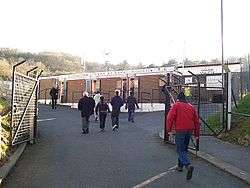
Dover Athletic's home ground since the club's foundation has been the Crabble Athletic Ground, which was also the home of the former Dover club.[2] The word Crabble, which is also found in the name of a local corn mill,[42] may derive from the Old English crabba hol, meaning a hole in which crabs are found.[43] The stadium, commonly known simply as "Crabble"[44] or, imprecisely, as "The Crabble",[45][46] forms part of a larger council-owned complex,[47] and the earlier Dover club originally shared the lower pitch with a rugby club, but moved to the upper pitch in the 1950s, adding a grandstand in 1951, followed soon after by terracing and floodlights.[2]
Dover Athletic continued to make improvements to the ground, although not in time to allow the club to take its place in the Football Conference in 1990. Subsequently new turnstiles were installed and two new terraces and a second grandstand added. These improvements meant that the club was able to gain promotion after its second Southern League title in 1993.[2] The stadium's modern capacity is 5,745 with 1,010 seats and 3,642 spectators under cover.[1]
In 2007 the club announced that under the new sponsorship deal with SeaFrance the stadium would be known officially as the SeaFrance Crabble Stadium, but a year later it was announced that the deal would not be renewed due to the ferry operator's financial constraints.[39][48] On 1 July 2008 local car dealership Perry's was announced as the club's new main sponsor and the stadium rebranded as the Perry's Crabble Stadium,[49] an arrangement which lasted until 2012. Between 2003 and 2004 it was known as the Hoverspeed Stadium under the terms of another such agreement.[50] Margate played their home matches at Crabble for two seasons from 2002 until 2004, while their own Hartsdown Park ground was being redeveloped.[51]
Supporters
In the club's early days Athletic struggled to attract crowds of over 150,[5] but by the time the club reached the Conference, crowds at Crabble were averaging around 1,000.[52][53][54] After the club's relegation to the Isthmian League Division One South, the average attendance fell to just over 800,[55] but when the club returned to the Premier Division for the 2008–09 season, the average attendance at Crabble was 1,293, the highest in the division.[56] The highest home attendance in the club's history was 5,645 for the match against Crystal Palace in the third round of the FA Cup on 4 January 2015. Although Athletic's improved monetary position means that the Supporters' Trust is no longer required to financially support the club, it remains active as a fundraising organisation.[57]
Statistics and records

Dover Athletic's highest finish in the English football league system was in the 2015–16 season, in which the team finished in fifth place in the Football Conference, the highest level of non-league football and the fifth level overall. The Whites have made 13 appearances in the final qualifying round of the FA Cup, but have only progressed to the first round proper three times. In the 2010–11 season, Dover reached the third round for the first time, defeating Football League Two teams Gillingham and Aldershot Town in the first two rounds before losing to Huddersfield Town of Football League One. In the 1997–98 season the Whites reached the semi-finals of the FA Trophy but missed out on an appearance at Wembley, losing to Cheltenham Town. The largest number of points the team has accrued is 102 in the 1989–90 season, and the highest total number of goals scored in a season is 89, scored in 40 matches in the 1985–86 season.[7] The team's biggest ever win was an 8–0 defeat of East Preston in September 2009,[58] and the heaviest defeat was a 7–1 loss to Poole Town in April 1984.[59]
The holder of the record for most appearances for Dover Athletic is Jason Bartlett, who played in 539 matches, and the all-time top goalscorer is Lennie Lee, with 160 goals.[60] The club's record signing is Dave Leworthy, who joined the club from Farnborough Town in 1993 for £50,000,[1] which at the time was the highest transfer fee ever paid between non-league clubs.[61] The highest confirmed fee received by the club was also £50,000, paid by Brentford in 1997 for Ricky Reina.[1]
Players
- As of 4th November 2016[62]
Note: Flags indicate national team as defined under FIFA eligibility rules. Players may hold more than one non-FIFA nationality.
|
|
Former players
- For a list of former Dover Athletic players with Wikipedia articles, see Category:Dover Athletic F.C. players.
Managers
Dover Athletic have had 17 permanent managers (excluding caretaker managers) in the club's 25-year history, with Chris Kinnear's 10-year stint being the longest. The shortest stay was Ian Hendon who was announced as manager on 28 May 2010 and resigned only 18 days later to join Andy Hessenthaler at Gillingham.
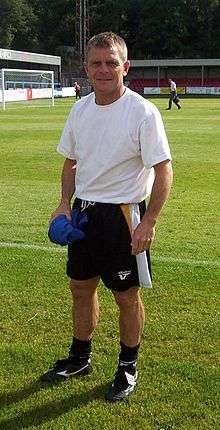
| From | To | Manager | Notes |
|---|---|---|---|
| 1983 | 1984 | Alan Jones | [5] |
| 1984 | 1984 | Graham Sawyer (caretaker) | [63] |
| 1984 | 1985 | Steve McRae | [5] |
| 1985 | 1995 | Chris Kinnear | [9] |
| 1995 | 1995 | Nigel Donn and Dave Leworthy (caretakers) | [9] |
| 1995 | 1995 | John Ryan | [10][11] |
| 1995 | 1996 | Peter Taylor | [64] |
| 1996 | 1997 | Joe O'Sullivan | [65] |
| 1997 | 2001 | Bill Williams | [66] |
| 2001 | 2001 | Gary Bellamy | [67] |
| 2001 | 2001 | Clive Walker (caretaker) | [15] |
| 2001 | 2002 | Neville Southall | [16] |
| 2002 | 2003 | Clive Walker | [16][19] |
| 2003 | 2004 | Richard Langley | [20] |
| 2004 | 2004 | Gary Whittle (caretaker) | [20] |
| 2004 | 2005 | Steve Browne | [68][69] |
| 2005 | 2007 | Clive Walker | [23] |
| 2007 | 2010 | Andy Hessenthaler | [70] |
| 2010 | 2010 | Ian Hendon | [71][72] |
| 2010 | 2011 | Martin Hayes | [73][74] |
| 2011 | 2013 | Nicky Forster | [75] |
| 2013 | present | Chris Kinnear | [76] |
Honours
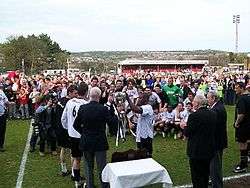
- Southern League
- Isthmian League
- Premier Division champions 2008–09[28]
- Division One South champions 2007–08[27]
- Kent Senior Cup
- Conference South
- Play-off winners 2013–14
Rivalries
Dover Athletic's main rivalry is with nearby Folkestone Invicta.[77] A meeting between the two teams in 2004 was watched by a crowd of 2,278, a record attendance for a league match at Invicta's ground.[78] The club also has a rivalry with Margate.[79] In the 2001–02 season, when both teams were in the Football Conference, the two games between Margate and Dover were watched by a combined total of more than 6,000 spectators. The game played at Margate's Hartsdown Park stadium drew a crowd of 3,676, and 2,325 were in attendance for the game at Dover.[80]
References
- 1 2 3 4 5 6 7 8 Williams, Tony; Mike Williams (2007). Non-League Club Directory 2007. Tony Williams Publications Ltd. p. 515. ISBN 1-869833-55-4.
- 1 2 3 4 5 6 "Dover Athletic F.C.". Pyramid Passion. Retrieved 2008-01-02.
- ↑ Stuart Croll (2007-09-25). "Ground of the Week : The Crabble Stadium". BBC. Retrieved 2008-02-02.
- 1 2 "Hessenthaler named Dover manager". BBC. 2007-05-29. Retrieved 2008-02-02.
- 1 2 3 4 5 6 7 "John Husk". Dover Athletic F.C. Retrieved 2008-01-02.
- 1 2 3 "England – Southern League Final Tables". RSSSF. 2005-07-04. Retrieved 2008-02-04.
- 1 2 3 4 5 6 7 8 9 "Dover Athletic". The Football Club History Database. Retrieved 2008-02-02.
- ↑ "Football Conference 1993–94". The Football Club History Database. Retrieved 2008-02-05.
- 1 2 3 Rupert Metcalf (1995-01-13). "NON-LEAGUE FOOTBALL: Stamco ready to ride the hard road". London: The Independent. Retrieved 2008-01-02.
- 1 2 Rupert Metcalf (1995-02-17). "Sittingbourne net Lovell". London: The Independent. Retrieved 2008-01-02.
- 1 2 3 "Football: Taylor's a fast mover". The Argus. 2000-11-15. Retrieved 2008-01-02.
- 1 2 "Bill Williams Resigns". Dover Athletic F.C. 2001-05-14. Retrieved 2008-02-05.
- ↑ "Dover appoint Southall". BBC. 2001-12-18. Retrieved 2008-02-07.
- ↑ Harling, Nicholas (2001-11-01). "Nationwide Conference: Dover on the brink". London: The Daily Telegraph. Retrieved 2008-02-05.
- 1 2 Luscombe, Richard (2001-11-11). "Nationwide Conference: Dover win lifts gloom". London: The Daily Telegraph. Retrieved 2008-02-05.
- 1 2 3 "Dover appoint Walker". BBC. 2002-03-13. Retrieved 2008-01-02.
- ↑ "Football Conference 2001–02". The Football Club History Database. Retrieved 2008-02-05.
- ↑ Steve Cattermole (2002-06-19). "CVA Proposal Gets Green Light". Dover Athletic F.C. Retrieved 2008-02-05.
- 1 2 "Walker goes at Dover". Non-League Daily. 2003-10-29. Archived from the original on 2012-06-01. Retrieved 2008-01-02.
- 1 2 3 Simon Wigmore (2004-09-13). "Kemp bows to pressure over Langley". London: Daily Telegraph. Retrieved 2008-01-02.
- ↑ "Club must raise £48,000 or close". BBC. 2004-11-25. Retrieved 2008-02-05.
- ↑ Justin Allen (2005-01-06). "Jim's Takeover Bid Confirmed". Dover Athletic F.C. Retrieved 2008-02-05.
- 1 2 "Whites are Clive and kicking". Dover Athletic F.C. 2005-01-17. Retrieved 2008-01-02.
- ↑ Justin Allen (2006-08-01). "CVA Agreement Reached". Dover Athletic F.C. Retrieved 2008-02-05.
- ↑ "Club History". Tonbridge Angels F.C. Archived from the original on 18 December 2007. Retrieved 2008-02-05.
- ↑ "Ten-man Hastings reach play-off final". The Argus. 2007-05-02. Retrieved 2008-02-05.
- 1 2 "Dover ease to Ryman South title". BBC. 2008-04-05. Retrieved 2008-04-09.
- 1 2 Howard, Tom (2009-03-28). "Dover Athletic crowned Ryman Premier champions". Eastern Daily Press. Retrieved 2009-03-28.
- ↑ Slavin, Chris (1 May 2010). "Woking book play-off final spot at Dover". Surrey Herald. Archived from the original on 2011-07-24. Retrieved 1 May 2010.
- ↑ Pritchard, David (6 November 2010). "Dover dump ailing Gills out of FA Cup". Eastern Daily Press. Retrieved 6 November 2010.
- ↑ "Dover 2 – 0 Aldershot". BBC News. 27 November 2010. Retrieved 27 November 2010.
- ↑ "Blue Square Bet South play-offs: Salisbury promoted". BBC News. 12 May 2013. Retrieved 12 May 2013.
- ↑ Inkersole, Sam (26 April 2014). "Dramatic Dover clinch last-gasp Conference South play-off spot". Dover Express. Retrieved 28 April 2014.
- ↑ Inkersole, Sam (3 May 2014). "Ten-man Dover Athletic crush Sutton to reach play-off final". Dover Express. Retrieved 9 May 2014.
- ↑ "Dover promoted to Conference after Ebbsfleet play-off victory". BBC Sport. 10 May 2014.
- ↑ "Cheltenham Town 0–1 Dover Athletic". BBC. 2014-12-07. Retrieved 2014-12-08.
- ↑ "Dover Athletic 0–4 Crystal Palace". BBC. 2015-01-04. Retrieved 2015-01-05.
- ↑ "Dover Athletic 0–1 Forest Green Rovers". BBC. 2016-04-30. Retrieved 2016-04-30.
- 1 2 3 4 Matthew Clements (2007-01-08). "SeaFrance on board". Dover Athletic F.C. Retrieved 2008-02-04.
- ↑ "Team Photos". The History of Dover Football Club. Retrieved 2008-02-04.
- ↑ "New sponsor deal for Dover". BBC. 2000-07-25. Retrieved 2008-02-11.
- ↑ "Crabble Corn Mill". Crabble Corn Mill Trust. Retrieved 2008-02-04.
- ↑ "The Origin of Dover's Name". Dover-Kent.co.uk. Retrieved 2008-02-02.
- ↑ "Visiting Crabble". Dover Athletic F.C. Retrieved 2008-02-27.
- ↑ "Dover 1–1 Morecambe". BBC. 2002-04-20. Retrieved 2008-02-16.
The hosts, already relegated, showed plenty of spirit and enjoyed the majority of possession in an entertaining encounter at The Crabble.
- ↑ Metcalf, Rupert (2003-02-21). "Slade enraged by Dover defeat". London: The Independent. Retrieved 2008-02-16.
Dover entertain Forest Green Rovers at The Crabble in the fifth round of the Trophy.
- ↑ "Crabble Athletic Ground, Dover". Dover District Council. Retrieved 2008-02-04.
- ↑ "Sponsor cutback hits Whites". Dover Athletic F.C. 2008-05-27. Retrieved 2008-06-05.
- ↑ "Whites in the fast lane". Dover Athletic F.C. 2008-07-01. Retrieved 2008-07-02.
- ↑ "New sponsorship deal for Dover brings new ground name". Non League Daily. 2003-07-05. Archived from the original on 2012-06-01. Retrieved 2008-02-14.
- ↑ "The History of Margate Football Club". margatefchistory.co.uk. Archived from the original on 2010-06-10. Retrieved 2008-02-04.
- ↑ "Stats 1999/2000: Dover Athletic". ConfGuide.com. Archived from the original on 2005-05-06. Retrieved 2008-02-04.
- ↑ "Stats 2000/1: Dover Athletic". ConfGuide.com. Archived from the original on 2005-05-03. Retrieved 2008-02-04.
- ↑ "Stats 2001/2: Dover Athletic". ConfGuide.com. Archived from the original on 2005-04-28. Retrieved 2008-02-04.
- ↑ "Attendances: Isthmian League Division One South". Tony's English Football Site. Retrieved 2008-05-21.
- ↑ "Attendances: Isthmian League Division One South". Tony's English Football Site. Retrieved 2009-05-30.
- ↑ Paul Harrison. "Trust Statement". Dover Athletic Supporters' Trust. Retrieved 2008-02-07.
- ↑ Harris, Kevin (2009-09-26). "Record win sends Dover through". Dover Athletic F.C. Retrieved 2009-09-28.
- ↑ "Dover Athletic all-time records". Soccerbase. Retrieved 2008-02-02.
- ↑ "Dover Athletic". Non-League Daily. Archived from the original on 2012-06-01. Retrieved 2008-02-02.
- ↑ "He played them both – Spurs: David Leworthy". Vital Football. Retrieved 2008-02-02.
- ↑ "Player profiles". Dover Athletic F.C. Retrieved 2008-02-02.
- ↑ "Graham Sawyer". margatefchistory.co.uk. 2006-09-16. Archived from the original on 2009-08-26. Retrieved 2008-01-02.
- ↑ "Taylor-made for top job". BBC. 2000-11-14. Retrieved 2008-01-02.
- ↑ Rupert Metcalf (1997-01-24). "Football: Stevenage to take up the cry". London: The Independent. Retrieved 2008-01-02.
- ↑ Triggs, Roger (2001). The Men Who Made Gillingham Football Club. Tempus Publishing Ltd. p. 339. ISBN 0-7524-2243-X.
- ↑ "Gary Bellamy". Chesterfield F.C. 2007-12-02. Archived from the original on 2008-08-20. Retrieved 2008-01-02.
- ↑ "Browne's the Whites choice". Dover Athletic F.C. 2004-10-12. Retrieved 2008-01-02.
- ↑ Phil Windeatt (2005-01-17). "Dover Athletic 1 Kingstonian 2". This Is Local London. Archived from the original on 3 November 2005. Retrieved 2008-01-02.
- ↑ "Hess unveiled as new Whites manager". Kent Online. 2007-05-29. Retrieved 2008-01-02.
- ↑ "Hendon takes over Crabble". Dover Athletic F.C. 28 May 2010. Retrieved 28 May 2010.
- ↑ "Hendon Quits". Dover Athletic F.C. 10 June 2010. Retrieved 10 June 2010.
- ↑ "Hayes is new Whites boss". Dover Athletic F.C. 16 June 2010. Retrieved 16 June 2010.
- ↑ "Hayes released by club". Dover Athletic F.C. 26 September 2011. Retrieved 26 September 2011.
- ↑ "Nicky Forster unveiled as new Dover Athletic manager". Kent Online. 27 September 2011. Retrieved 27 September 2011.
- ↑ "Kinnear returns to Crabble". Dover Athletic F.C. 19 January 2013. Retrieved 19 January 2013.
- ↑ "Dryden breaks Invicta record and Dover's hearts". kentishfootball.co.uk. 2005-03-28. Archived from the original on 2014-07-15. Retrieved 2008-02-06.
In the post-match press conference, Folkestone Invicta boss Neil Cugley was delighted with their victory over their local rivals.
- ↑ "Folkestone Invicta FC". BBC. 2007-07-17. Retrieved 2008-02-04.
- ↑ "History/Honours". Margate F.C. Archived from the original on 2007-12-12. Retrieved 2008-02-04.
... with the highest single attendance being just under 4,000 for the Boxing Day game against local rivals Dover Athletic.
- ↑ "Fixtures 2001/2 : Margate". Confguide.com. Archived from the original on 2007-04-08. Retrieved 2008-01-08.
External links